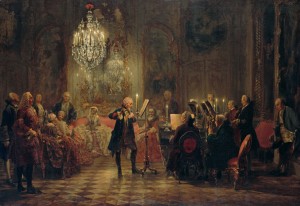Maundy Thursday
One of the most stunning arias in Bach‘s St. Matthew Passion is without a doubt Aus Liebe will mein Heiland sterben. This aria comes as a quiet interruption of the most intense part of Jesus’ trial before Pilate. The crowd is screaming for Jesus’ crucifixion, and Pilate, fearing a riot, gives them what they demand. In between two shouts of “crucify him”, comes the aria.
Even more stunning is the bizarre orchestration: flute and soprano dance together on two unique melodies, accompanied by two oboes da caccia (predecessor of the modern English horn) – basically a low-pitched oboe. The oboes, I should mention, are by no means low-pitched instruments, nor are they really well adapted at playing the part Bach wrote for them – a funny, pulsing sort of heartbeat.
Heard alone, the aria is so melancholy it hurts. Heard in context, between two loud shouts of “crucify him!”, it is as if Bach was able to pause time to illuminate a glimmer of love in a time of intense hatred.


Recent Comments